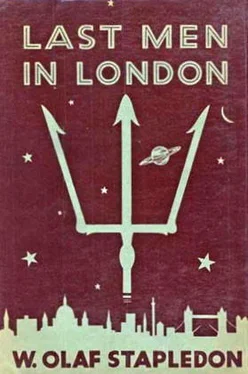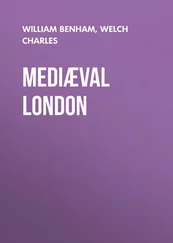Even in the class-room, expounding to reluctant urchins the structure of sentences, the provisions of Magna Carta, the products of South America, Paul constantly struggled for balance in that remote ethereal sphere. Sometimes he would even fall into complete abstraction, gazing with disconcerting intensity at some boy or other, while the particular juvenile spirit took form in his imagination, conjured by my skill. He would begin by probing behind the defensive eyes into the vast tangled order of blood-vessels and nerve fibres. He would seem to watch the drift of blood corpuscles, the very movements of atoms from molecule to molecule. He would narrow his eyes in breathless search for he knew not what. Then suddenly, not out there but somehow in the depth of his own being, the immature somnolent spirit of the child would confront him. He would intimately savour those little lusts and fears, those little joys and unwilling efforts, all those quick eager movements of a life whose very earnestness was but the earnestness of a dream. With the boy’s hand in the boy’s pocket he would finger pennies and sixpences, or a precious knife or toy. He would look into all the crannies of that mind, noting here a promise to be fulfilled, there a blank insensitivity, here some passion unexpressed and festering. Rapt in this contemplation, he would fall blind to everything but this unique particular being, this featured monad. Or he would hold it up in contrast with himself, as one might hold for comparison in the palm of the hand two little crystals, or in the field of the telescope a double star. Sometimes it would seem to him that the boy and himself were indeed two great spheres of light hugely present to one another, yet held eternally distinct from one another by the movement, the swing, of their diverse individualities. Then, like a memory from some forgotten life, there would come to him the thought, ‘This is just Jackson Minor, a boy whom I must teach.’ And then, ‘Teach what’!’ And the answer, more apt than explicit, ‘Teach to put forth an ever brighter effulgence of the spirit.’
While Paul was thus rapt, some movement would recall the class to him, and he would realize with a kind of eager terror that not only one but many of these huge presences were in the room with him. It was as though by some miracle a company of majestic and angelic beings was crowded upon this pin-point floor. And yet he knew that they were just a bunch of lads, just a collection of young and ephemeral human animals, who almost in the twinkle of a star would become black-coated citizens, parents, grandparents and discreetly laid-out corpses. Between then and now, what would they do’! What were they for’! They would do geography and scripture, they would make money or fail to make money, they would take young women to the pictures, they would do the done thing, and say the said thing. Then one day they would realize that they were growing old. Some of them would scream that they had not yet begun to live, others would shrug and drift heavily gravewards. So it would be, but why?
In the lunch hour, or when the school day was over, or in the evening when he was waiting to go to some show, he would let himself glide on the street flood to watch the faces, the action, to speculate on the significance of this gesture and that.
Sometimes he would walk unperturbed through street after street, carelessly turning the pages of the great picture book, dwelling lightly for a moment on this or that, on this comicality or elegance, on that figure of defeat or of complacency. Straying up Regent Street, he would amuse himself by sorting out the natives from the provincial visitors, and the foreign nationals from one another. He would surmise whether that painted duchess knew how desolate she looked, or that Lancashire holiday-maker how conscious that he was a stranger here, or whether the sweeper, with slouch hat and broom, felt, as he looked, more real than the rest. Odours would assail him: odour of dust and horse-dung, odour of exhaust fumes, rubber and tar, odour of cosmetics precariously triumphing over female sweat. Sounds would assail him: footsteps, leather-hard and rubber-soft, the hum and roar of motors, the expostulation of their horns; voices also of human animals, some oddly revealing, others a mere mask of sound, a carapace of standard tone, revealing nothing. Above all, forms and colours would assail him with their depths of significance. Well-tailored young women, discreet of glance; others more blowsy, not so discreet. Young men, vacantly correct, or betraying in some movement of the hand or restlessness of the eye an undercurrent of self-doubt. Old men, daughter-attended, tremblingly holding around their withered flesh the toga of seniority, bath-wrap-wise. Women of a past decade, backward leaning for weight of bosom, bullock-eyed, uncomprehending, backward straining under the impending pole-axe. After the smooth drift of Regent Street, he would find himself in the rapids of Oxford Street, buffeted, whirled hither and thither by successive vortices of humanity, of tweed-clad men, and women of artificial silk, of children toffee-smeared, of parents piloting their families, of messenger boys, soldiers, sailors, Indian students, and everywhere the constant flood of indistinguishable humanity, neither rich nor poor, neither beautiful nor ugly, neither happy nor sad, but restless, obscurely anxious, like a dog shivering before a dying fire.
At some point or other of his easeful wandering a change would probably happen to Paul. He would suddenly feel himself oppressed and borne down by the on-coming flood of his fellows. He would realize that he himself was but one indistinguishable drop in this huge continuum; that everything most unique and characteristic in him he had from It; that nothing whatever was himself, not even this craving for discrete existence; that the contours of his body and his mind had no more originality than one ripple in a wave-train. But with a violent movement of self-affirmation he would inwardly cry out, ‘I am I, and not another.’ Then in a flash he would feel his reality, and believe himself to be a substantial spirit, and eternal. For a moment all these others would seem to him but as moving pictures in the panorama of his own all-embracing self. But almost immediately some passing voice-tone in the crowd, some passing gesture, would stab him, shame him into realization of others. It would be as in the class-room. He would be overwhelmed not by the featureless drops of an ocean, but by a great company of unique and diverse spirits. Behind each on-coming pair of eyes he would glimpse a whole universe, intricate as his own, but different; similar in its basic order, but different in detail, and permeated through and through by a different mood, a different ground-tone or timbre. Each of them was like a ship forging toward him, moving beside him and beyond, and trailing a great spreading wake of past life, past intercourse with the world. He himself, it seemed, was tossed like a cork upon the inter-crossing trains of many past careers. Looking at them one by one as they came upon him, he seemed to see with his miraculous vision the teeming experiences of each mind, as with a telescope one may see on the decks of a passing liner a great company of men and women, suddenly made real and intimate, though inaccessible. The ship’s bow rises to the slow waves, and droops, in sad reiteration, as she thrusts her way forward, oxlike, obedient to some will above her but not of her. And so, seemingly, those wayfarers blindly thrust forward on their courses, hand-to-mouth fulfilment of their mechanism, ignorant of the helmsman’s touch, the owner’s instructions. Here, bearing down upon him, would appear perhaps a tall woman with nose like a liner’s stem, and fo’c’sle brows. Then perhaps an old gentleman with the white wave of his moustache curling under his prow. Then a rakish young girl. Then a bulky freighter. Thus Paul would entertain himself with fantasies, till sooner or later a bleak familiar thought would strike him. Each of these vessels of the spirit (this was the phrase he used) had indeed a helmsman, keeping her to some course or other; had even a master, who worked out the details of navigation and set the course; but of owner’s instructions he was in most cases completely ignorant. And so these many ships ploughed hither and thither on the high seas vainly, not fulfilling, but forlornly seeking, instructions. And because the mechanism of these vessels was not of insensitive steel but of desires and loathings, passions and admirations, Paul was filled with a great pity for them, and for himself as one of them, a pity for their half-awakened state between awareness and unawareness.
Читать дальше












